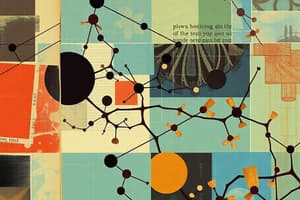Podcast
Questions and Answers
What is the process called when a ligand binds to a receptor and results in a specific intracellular response?
What is the process called when a ligand binds to a receptor and results in a specific intracellular response?
- Molecular activation
- Receptor regulation
- Signal transduction (correct)
- Biochemical alteration
Which type of ligand interacts with the receptor, activating it with both affinity and efficacy?
Which type of ligand interacts with the receptor, activating it with both affinity and efficacy?
- Inverse agonist
- Partial agonist
- Full agonist (correct)
- Competitive antagonist
What is the ability to predict efficacy of a partial agonist in the presence and absence of a pure agonist a part of?
What is the ability to predict efficacy of a partial agonist in the presence and absence of a pure agonist a part of?
- Types of antagonists
- Receptor-mediated mechanisms
- Mechanisms of receptor regulation
- Pharmacodynamics Intended Learning Outcomes (ILOs) (correct)
What is the term for a ligand that can combine with receptors to produce a response?
What is the term for a ligand that can combine with receptors to produce a response?
What type of antagonist competes with the agonist for the same binding site on the receptor?
What type of antagonist competes with the agonist for the same binding site on the receptor?
Flashcards are hidden until you start studying
Study Notes
Ligand-Receptor Interactions
- The process when a ligand binds to a receptor resulting in a specific intracellular response is known as ligand-receptor interaction or signal transduction.
- Ligands can regulate the signaling pathways that lead to various cellular responses.
Types of Ligands
- Full agonists are ligand types that interact with receptors, activating them with both affinity (ability to bind) and efficacy (ability to elicit a response).
- Efficacy refers to the effectiveness of a ligand to produce a response once bound to its receptor.
Predicting Efficacy
- The ability to predict the efficacy of a partial agonist in the presence or absence of a pure agonist is part of the concept of pharmacological interaction dynamics.
- Partial agonists have varying degrees of efficacy at the same receptor compared to full agonists, influencing their effects in different environments.
Ligands and Responses
- A ligand that can combine with receptors to produce a biological response is termed an agonist.
- Agonists activate receptors, leading to physiological effects depending on the receptor type.
Types of Antagonists
- Competitive antagonists are a type of antagonist that competes with agonists for the same binding site on the receptor.
- By binding to the receptor and preventing agonists from attaching, competitive antagonists hinder the activation of the receptor and its downstream effects.
Studying That Suits You
Use AI to generate personalized quizzes and flashcards to suit your learning preferences.




